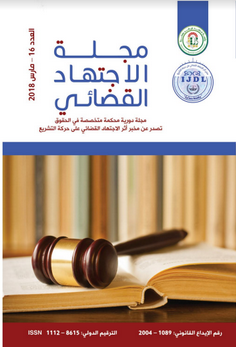أثر صحة اقتناع القاضي الجزائي على تسبيب الحكم الجزائي
Résumé
يعد موضوع أثر صحة اقتناع القاضي الجزائي على تسبيب الحكم الجزائي من أهم مواضيع القانون الإجرائي الجزائي لاعتباره يهتم بمنهجية نشاط القاضي الجزائي وطريقة وصوله إلى حكم جزائي عادل. كما يخضع لمبدأ هام وجوهري هو مبدأ حرية الاقتناع القضائي، وللقاضي الجزائي كأصل عام أن يستند إلى أي دليل جنائي لبناء اقتناعه، ولا تعني هذه الحرية أنها غير مقيد بالالتزام بمجموعة من الضوابط والأسس التي تضبط سلامة وصحة اقتناعه، ويبقى تدليل القاضي على صحة اقتناعه وما توصل إليه من نتيجة في حكمه التزاما يقع على عاتقه وهذا من خلال تسبيبه للحكم الجزائي الصادر عنه حتى يقنع نفسه وغيره بصحة ما توصل إليه اقتناعه.
الكلمات المفتاحية: القاضي الجزائي، تسبيب الحكم، الاقتناع القضائي، التشريع الجزائي الجزائري.
Abstract:
The effect of the validity of the criminal judge’s conviction is the most important issue of the criminal law, it concerns with the judge’s methodology and the way he thinks to reach to a fair criminal judgement, besides, the judge is obligated to take in consideration the principle of the freedom of the judicial conviction, in general the judge depends to any criminal proof in order to build his conviction, however this freedom doesn’t mean that he is not obligated to follow the basics and the legal rules in addition.
The causation of the criminal judge of his decisive conviction and what he has reached to a result of his judgement is a duty and responsibility of him and this is through giving causation of the criminal judgement wich has issued by him in order to convict himself and the others to the validity of what his conviction has reached to.
Keywords: criminal judge, criminal judgement, Judicial conviction, Algerien criminal law.



